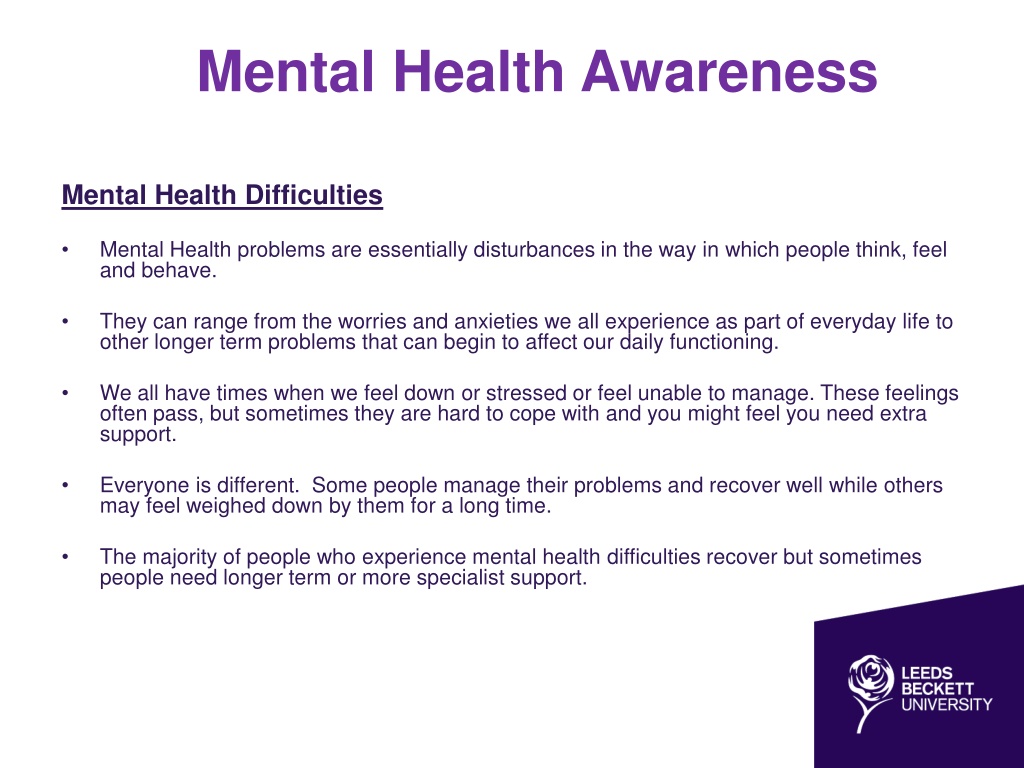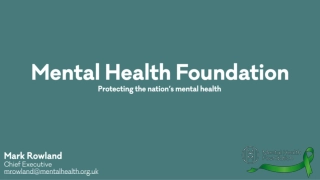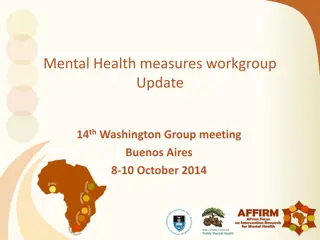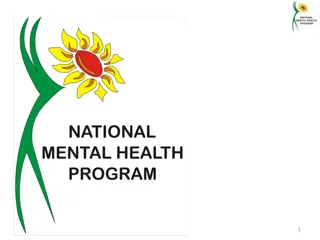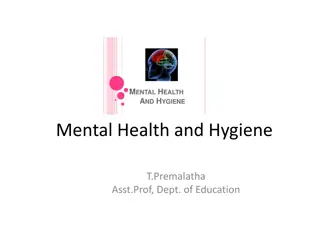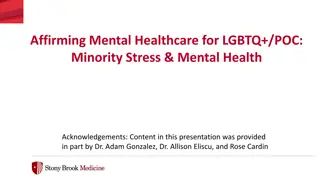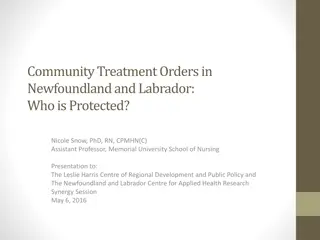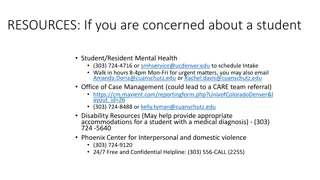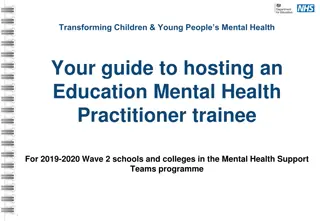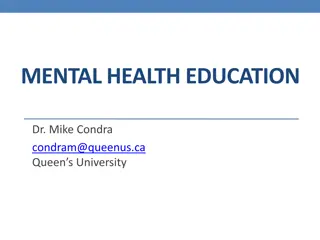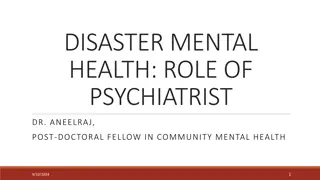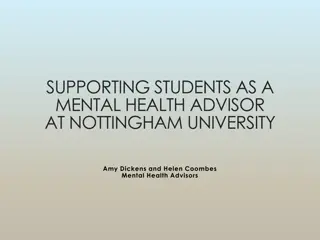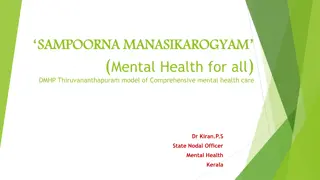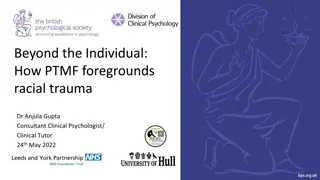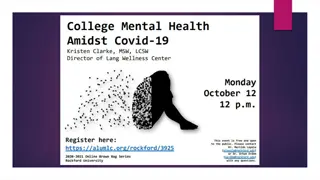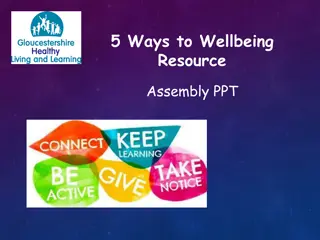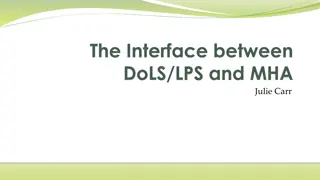Understanding Mental Health Difficulties in Students
Mental health problems can affect students' academic performance, social relationships, and overall well-being. This article explores the factors that impact students' mental health, signs to spot deteriorating mental health, and ways to support students dealing with such difficulties.
Download Presentation

Please find below an Image/Link to download the presentation.
The content on the website is provided AS IS for your information and personal use only. It may not be sold, licensed, or shared on other websites without obtaining consent from the author. Download presentation by click this link. If you encounter any issues during the download, it is possible that the publisher has removed the file from their server.
E N D
Presentation Transcript
Mental Health Awareness health Awareness Mental Health Difficulties Mental Health problems are essentially disturbances in the way in which people think, feel and behave. They can range from the worries and anxieties we all experience as part of everyday life to other longer term problems that can begin to affect our daily functioning. We all have times when we feel down or stressed or feel unable to manage. These feelings often pass, but sometimes they are hard to cope with and you might feel you need extra support. Everyone is different. Some people manage their problems and recover well while others may feel weighed down by them for a long time. The majority of people who experience mental health difficulties recover but sometimes people need longer term or more specialist support.
Mental Health Awareness Student Mental Health While many students with mental health difficulties manage university life well there will be some students who find their mental health difficulties affect their academic work, ability to settle into university life, make friends and have a positive experience. Sometimes mental health problems can be severely disruptive to a student s capacity to study and learn. What factors could impact on a students wellbeing? Students are at a stage of transition between dependence and independence. Adapting to perhaps living independently for the first time Forming new social networks (can often lead to isolation) Working academically in a new environment (more autonomous self directed learning and prioristising work) Managing a tight budget (perhaps having to work part time) The student population has also become increasingly diverse There is an increase in modular learning which can result in students progressing through courses over differing timescales. (less contact with tutors/relationships not being formed) Rates of family breakdown have increased enormously over the past few decades. For international students they have the added challenge of living in a new country and adapting to a different culture. Increasing pressures around money, body, lifestyle Consumerism, 24 hour social networking and what is available and accessible to young people
Mental Health Awareness Spotting the signs? Presentations/behaviours which may indicate deteriorating mental health.
Mental Health Awareness Low mood, miserable, tearful or overly anxious Withdrawn or unusually quiet Observed decline in personal appearance/appearing unkempt Inappropriate dress; more flamboyant and or revealing/overtly sexual Excessive signs of fatigue/exhaustion Speech - loud, inappropriate in content, pressured rapid, difficult to interrupt Erratic behaviour or behaviour that is out of character Difficulty concentrating in lectures/seminars or in conversation appear preoccupied Visible signs of self harming such as cuts, burns, scarring. Behaviour may be seen as tense, irritable, agitated Appear withdrawn, detached from other people and the environment Finding it difficult to relate to/communicate with other people Expressing feelings of hopelessness, despair, or extreme loneliness Thought disturbance, e.g. difficulty sustaining conversation may be thought blocked or evidence of jumbled thoughts. Talking about suicide or self-harm, or actually doing/attempting it Mood or behaviour changes (maybe subtle or significant) Talking incoherently/or ideas jumping from subject to subject Reduced productivity, judgement, memory, concentration
Mental Health Awareness Wide range of diagnosis or conditions/presentations Most common presentations amongst students: Anxiety Depression Other less common conditions : Bi-polar disorder Psychosis / Schizophrenia Personality disorder OCD / Phobias Eating disorder Alcohol/addictions
Mental Health Awareness Anxiety The feeling we get when our body responds to frightening or threatening experience/an unpleasant feeling we all get from time to time. Anxiety can be generalised across a range of situations, or may be situation-specific (e.g. exam anxiety, social anxiety, public speaking anxiety). Anxiety affects how we feel, think, behave, our body. It manifests itself in a variety of ways. Feelings: Nervous, worried, frightened, stressed, tense, unsettled, panicky, irritable Thinking : Constant worry, thoughts racing, minds jumping, imagining the worst Common Thoughts : I m cracking up, I m going to have a heart attack, I can t cope, I ve got to get out of here. What happens to your body: Heart pounds, chest feels tight, butterflies, stomach churning, jumpy, having to go to the toilet, sweating, dizzy, light headed. Behaviours Avoidance, pacing, getting flustered, irritable, unable to relax, talking quickly
Mental Health Awareness Depression / low mood Feelings: Persistent low mood, feeling down, tearfulness, low motivation, feeling alone Thoughts : Self critical, I m no good, I ve wasted another day, low self confidence, helplessness, what is the point in life Physical Symptoms : Lethargic, tired, irritable, changes in appetite, sleep disturbance Behaviours : Self isolation, reduced motivation reduced self care, less animated and expressive - facially flat, reduced eye contact
MenMental Health Awarenessalt Awareness Sleep Sunlight Relaxation Physical Activity Diet (TAKE CARE OF SELF) Vicious Cycle Negative Thoughts Over Generalise Ignore Positive (CHALLENGE) Problem Solving Solutions Recognise personal Qualities (SELF REWARD) Make good use of time (motivation) Diary plan Small Steps (POSITIVE BEHAVIOUR)
Mental Health Awareness Risk Factors Depression has no single cause and can involve the interaction of many factors (psychological, environmental, biological). Life events : relationships, bereavement/loss, stressful event/trauma such as being a victim of crime, academic problems Physical : Medical conditions, stress, medication Social situation : Isolation, loneliness, bullying/abuse
Mental Health Awareness Suicide: Risk Factors / warning signs Depression, including excessive feelings of guilt or shame, self reproach and anger Feelings of worthlessness and very low self-esteem, particularly if accompanied by very high ideals or expectations Feelings of hopelessness, helplessness and futility Isolation, feelings of alienation History of previous suicide attempts Any evidence of suicidal thoughts or plans sorting affairs, finances, possessions. Alcohol and/or other substance abuse Recent severe trauma or stressful event such as a major loss, or the threat of loss Significant changes of behaviour, e.g. becoming withdrawn, when this is not typical of the individual. Male gender (3 times more likely than women) Concurrent mental disorders Certain professions - doctors, students Hopelessness, talking about feeling trapped or unable to cope with distress People who are suicidal often tell people about their thoughts or give clues to others about their feelings . (sources Papyrus / NHS / Samaritans/ Mental Wealth/NHS)
Mental Health Awareness Suicide: What should you do? Ask Asking if a person feels suicidal is extremely unlikely to put the idea into their head, and they are more likely to be relieved to not be holding it alone anymore. Ask the student directly about feelings and plans. ( Are you thinking of killing yourself? How have you thought about doing it? ) Listen Take what they say seriously. Try to understand their perspective of the situation. The student may be able to tell you what they need and who might help. Discuss Try to discover what might make a difference without imposing your solutions on the situation. Offer practical help towards problem solving - e.g. lifting an academic deadline. *** Don't over-reach your own limits of time or expertise **** Refer - Do not take sole responsibility for the situation. Sensitively indicate that you are concerned enough to arrange for further help, even if it means breaking confidence. They must speak to an experienced practitioner as soon as possible. Express care and concern, and assure the student that you will help him or her get professional help. If you are unsure seek advice without breaching confidentiality first.
Mental Health Awareness If you are concerned about a student, follow your instinct and encourage them to talk to you. Talking about self destructive feelings does not make it more likely to happen. Also if you don t ask they are unlikely to tell Listen attentively and acknowledge what they are saying, take it seriously and make it clear that you want to help. Express care and concern, and assure the student that you will help him or her get professional help Don't make light of it, criticise or be judgmental. Reassure them that you have heard what they are telling you. Give information to students about where they can get help, offer to initiate the call, or make an appointment for them yourself. Ask their permission to involve other - parents, friends and /or student support services. A diplomatic approach may be required with a student who does not recognise the need or is unwilling to accept help talk through all the options. Find out why they are reluctant and try to address that particular issue. If concerned about imminent risk contact appropriate emergency services.
Mental Health Awareness Leeds Beckett University Supports Students: On Line Registration Registration via our on-line form accessed from our webpage Registration at any time Variety of supports available Staff: Student Wellbeing Team provides staff: Consultancy, guidance and advice Joint meetings and on-going liaison with students Sharing of information to ensure co-ordinated approach to student experience Training MH Awareness sessions bookable via I-Trent Training MH Awareness: supporting Students module People Development on-line Support for Urgent Situations Student Wellbeing Webpages on Student Hub Extensive range of self help resources to be able to direct students to
Mental Health Awareness Other useful links Student Wellbeing Team Urgent Support Information for Students Urgent Support Information for Staff Self Help Resources for Staff and Students Leeds Mind Re-think Mental Health Foundation Time to Change Centre for Mental Health
